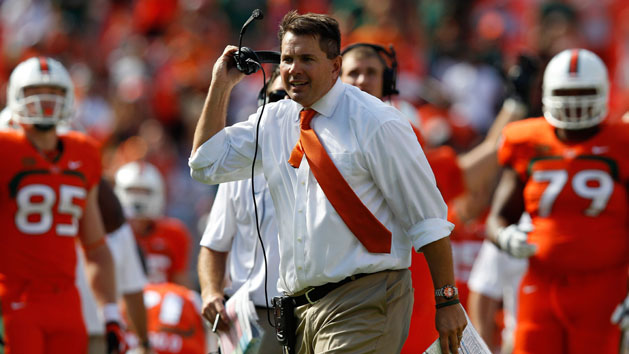
This time last year, the Miami Hurricanes football program was being held hostage by every college football program’s nemesis — the suits at the NCAA. No one knew why a ruling hadn’t come down much earlier on the Nevin Shapiro case and then when it was rendered, at how many angles the so-called “governing body of college athletics” had botched investigations on the case. It once again proved the lack of credibility of the NCAA.
That said, the interviews conducted by the NCAA were deemed impermissible and indeed wreaked of a witch hunt, so the ‘Canes probably induced those 2011 and 2012 postseason bans without need. Who would have known?
Now, Al Golden, for the first time in his five-year Miami tenure, starts with a clean slate as his Hurricanes are the pick in the ACC’s Coastal Division. Golden now is set on policing the program so that the stench of the agents won’t come into play on the beautiful Dade County campus again.
“I think I speak for all of the coaches,” said Golden, “We really don’t want to be in that process. We want to get accurate information for everybody. I think I read something recently talking about only five players from each team being evaluated. I don’t really know what that means.”
Golden has gone out of his way to try to provide information for all involved; from the athlete to the parents to the agent. He says that getting a plethora of information out there is a must and, of course, it can head off the NCAA suits if they set their eyes on Miami once again.
“I try to provide them with the resources they need so they can go through the process of checking boxes,” Golden said of trying to expedite the process. “In our place, we have the players meet with them on campus and are observed by someone in the athletic department. It’s a win-win for the campus, and it is a win-win for the young man, and his family.”
Golden noted that he thinks all of the coaches would love to be out of this process, but is not sure that is realistic. What he does at Miami is to get a list of questions answered about players and then submit the reports to the NFL. Later, a representative from the NFLPA comes in the spring and meets with his players.
Getting accurate information on where a player may land in the draft is a problem across the boards. Obviously, some of the more unscrupulous agents will try to pump up the draft spot of a certain player. Golden says at the end of the day, with the questioning, hopefully players, parents, and agents can all come away with a clearer picture of the player’s situation.
“Kids are getting a fourth round grade and they are saying, that’s good enough for me and then 100 kids are coming out,” Golden explained, “That’s three rounds of players and now they are coming out and going in the sixth or seventh round. That’s really hard on the young man. I really feel like we have to find a way to do it better.”
There is no uniformity from school to school on how to handle this situation; yet, when the NCAA decides it wants to swoon in on a program, such as Miami, it comes with its own set of trumped up rules and manifests its well-known selective enforcement method.
Golden is just as interested in the agencies placing a set of criteria in front of players so that they can know going into the evaluation period what is expected and how they will be graded out.
“What has happened is as murky as it can be,” noted Golden, “What is a third round grade right now if there are 100 guys coming out? Maybe we should set the pool and give grades. Maybe then, they have a chance to get in or a chance to get out. Those are all things that are important because we all want to get it right. I do not know any agents, player-personnel guys, or anybody associated with the NFLPA or any coach that doesn’t want to get it right.”
Golden even took the agent’s perspective in how misevaluations could cost an agent his credibility in the long run to secure players as they head to the NFL.
“People can say what they want to about agents, but at the end of the day, there’s no agent that wants to tell their guy, ‘You are going to go in the third round,’ and then he doesn’t get drafted. They don’t want to have that conversation. We don’t want to have that conversation.”
